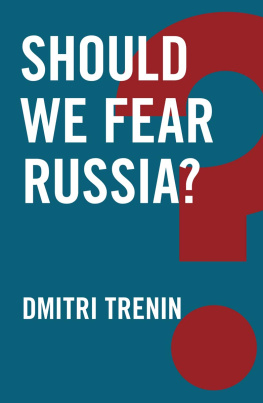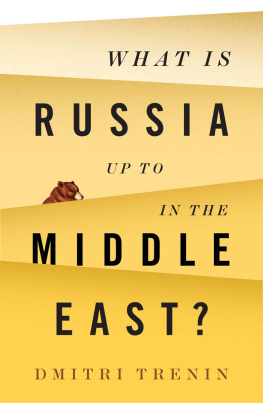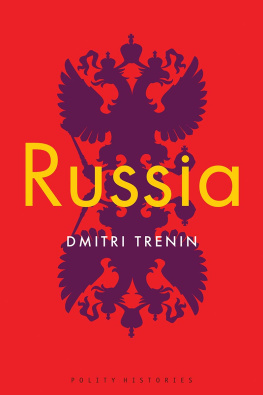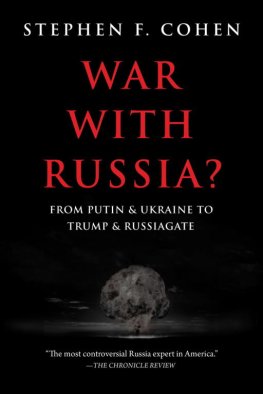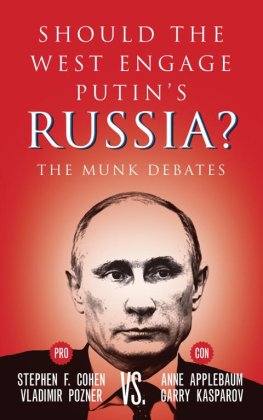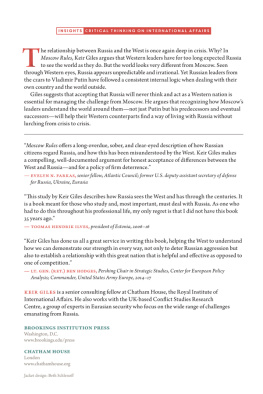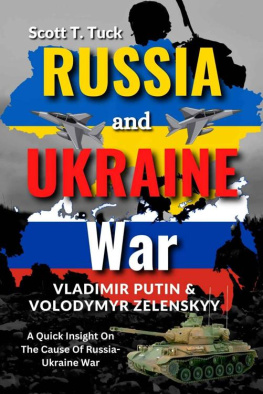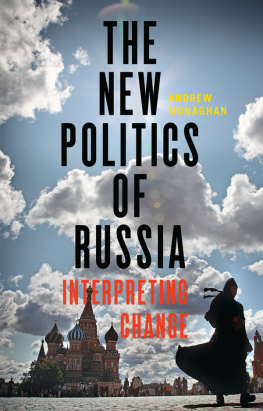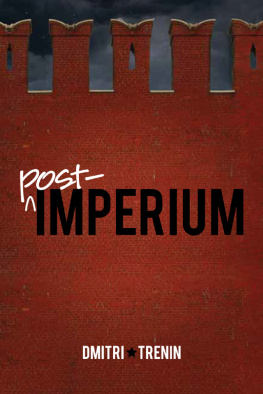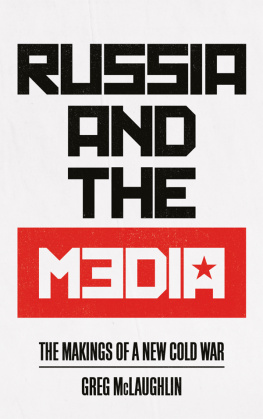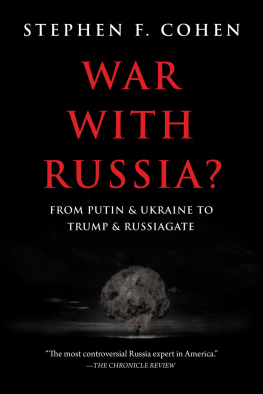Contents
Guide
Pages

No one is a wiser, more sophisticated, more subtle or more balanced student of Russian foreign policy than Dmitri Trenin. No one, anywhere. So, should the West fear Russia? His answer is, yes, but for reasons that are different and vastly more complex than the reasons driving the discourse in the West. US and European leaders will not get their policy toward Russia right until they come to terms with the arguments in this book.
Robert Legvold, Columbia University, and author ofReturn to Cold War
Dmitri Trenin makes a clear and compelling case that Russias Realpolitik may become more realistic and argues that the West should fear its weakness more than its strength. Trenins voice of reason makes an important and hopeful contribution to the current policy debate.
Joseph S. Nye, Jr., University Distinguished Service Professor, Harvard University, and author ofIs the American Century Over?
Dmitri Trenin is one of the most lucid analysts of Russia writing today. In this short but rich volume, he traces the recent history of misguided policy and conflicts of interest that have produced the current sharp deterioration in relations between Russia and the West. A new normal has emerged, he argues. It is not a second Cold War but a period of new challenges and opportunities, in which seeing Russia clearly is critical to peace and security. To that end, there is no better place to start than this present essay.
Thomas Graham, Managing Director, Kissinger Associates, and former Senior Director for Russia on the US National Security Council staff
Global Futures
Mohammed Ayoob, Will the Middle East Implode?
Christopher Coker, Can War be Eliminated?
Howard Davies, Can Financial Markets be Controlled?
Jonathan Fenby, Will China Dominate the 21st Century?
Andrew Gamble, Can the Welfare State Survive?
David Hulme, Should Rich Nations Help the Poor?
Joseph S. Nye Jr., Is the American Century Over?
Tamara Sonn, Is Islam an Enemy of the West?
Jan Zielonka, Is the EU Doomed?
Dmitri Trenin
Should We Fear Russia?
polity
Copyright Dmitri Trenin 2016
The right of Dmitri Trenin to be identified as Author of this Work has been asserted in accordance with the UK Copyright, Designs and Patents Act 1988.
First published in 2016 by Polity Press
Polity Press
65 Bridge Street
Cambridge CB2 1UR, UK
Polity Press
350 Main Street
Malden, MA 02148, USA
All rights reserved. Except for the quotation of short passages for the purpose of criticism and review, no part of this publication may be reproduced, stored in a retrieval system, or transmitted, in any form or by any means, electronic, mechanical, photocopying, recording or otherwise, without the prior permission of the publisher.
ISBN-13: 978-1-5095-1094-8
A catalogue record for this book is available from the British Library.
Library of Congress Cataloging-in-Publication Data
Names: Trenin, Dmitri, author.
Title: Should we fear Russia? / Dmitri Trenin.
Description: Malden, MA : Polity Press, 2016. | Series: Global futures series | Includes bibliographical references.
Identifiers: LCCN 2016015429 (print) | LCCN 2016026584 (ebook) | ISBN 9781509510900 (hardback) | ISBN 9781509510917 (pbk.) | ISBN 9781509510931 (Mobi) | ISBN 9781509510948 (Epub)
Subjects: LCSH: Russia (Federation)--Foreign relations. | Russia (Federation)--Military policy. | Russia (Federation)--Foreign relations--Western countries. | Western countries--Foreign relations--Russia (Federation)
Classification: LCC JZ1616 .T74 2016 (print) | LCC JZ1616 (ebook) | DDC 327.47--dc23
LC record available at https://lccn.loc.gov/2016015429
The publisher has used its best endeavours to ensure that the URLs for external websites referred to in this book are correct and active at the time of going to press. However, the publisher has no responsibility for the websites and can make no guarantee that a site will remain live or that the content is or will remain appropriate.
Every effort has been made to trace all copyright holders, but if any have been inadvertently overlooked the publisher will be pleased to include any necessary credits in any subsequent reprint or edition.
For further information on Polity, visit our website:
politybooks.com
Preface
Since early 2014, barely a day passes when manifestations of Russias foreign policy assertiveness and military resurgence dont make the headlines in the Western world. After Ukraine and Syria, it became absolutely clear: Russia has not only broken out of the post-Cold War order in its former Soviet neighborhood but challenged that order elsewhere. Two things stand out in Moscows recent actions: they caught a lot of people off guard, and they involved the use of force, sometimes in unorthodox ways. Thus, it is hardly surprising that the Russia threat is at the forefront of peoples minds. So, should Russia be feared?
The we in the title, of course, refers to the readers, wherever they live in the United States, Europe, Asia, the Middle East, or elsewhere who have become or have always been, to various degrees concerned about Russia. I was born in Moscow and live within a couple of miles from the Kremlin, the source of other peoples worries. And I pledge to you to give an honest answer to the question from inside the source of the perceived threat no easy commission.
Many in Russia would scoff at the question, dismissing it as an example of Western paranoia, age-old Russophobia, a throwback to the Cold War, or a deliberate attempt at smearing Russia. Like most people anywhere, most ordinary Russians think of their country as essentially good, reasonably friendly, and essentially peace-loving and, some will add, grossly misunderstood. Being able to look at ones country from a distance is a rare and poisoned gift.
More sophisticated Russians would explain that the present-day Russian Federation has no intention of changing the world according to her preferences, unlike its immediate predecessor, the Soviet Union or, some would not resist the temptation of saying, present-day America. Moscow, they would argue, is now guided by its interests rather than by ideologies. Russia is no real democracy, but it is part of the global capitalist economy and lives in a global information space. Its citizens are free to travel, and many have seen other parts of the world, where no one is perfect. Bottom line: demonizing anyone serves no useful purpose.
Realists would point out that Russia is a post-imperial polity, in transit to a nation-state, and a great power; that it has a set of security interests that others need to take account of, whether they agree with them or not. Annexing Crimea, in their view, was a defensive move against the post-Cold War expansion of the West, and its legitimacy lies not so much in the legality of the annexation as in the genuine will of the bulk of the Crimean population to join Russia. To this group, Russia is an underdog power fighting for its survival as a major independent geopolitical entity against the far superior forces of its competitors.
Neither set of arguments finds many takers outside of Russias borders. To a lot of its neighbors, Russia as a security problem still looms larger than life. Tsarist, communist or contemporary, it is still feared, and often hated. Those living in countries which are bigger, farther away and more self-confident face the uncomfortable reality of a Russia which is intensely feared by some of their partners and which itself actively challenges the order underpinned by their senior transatlantic ally, in whom they entrusted their security seven decades ago.

